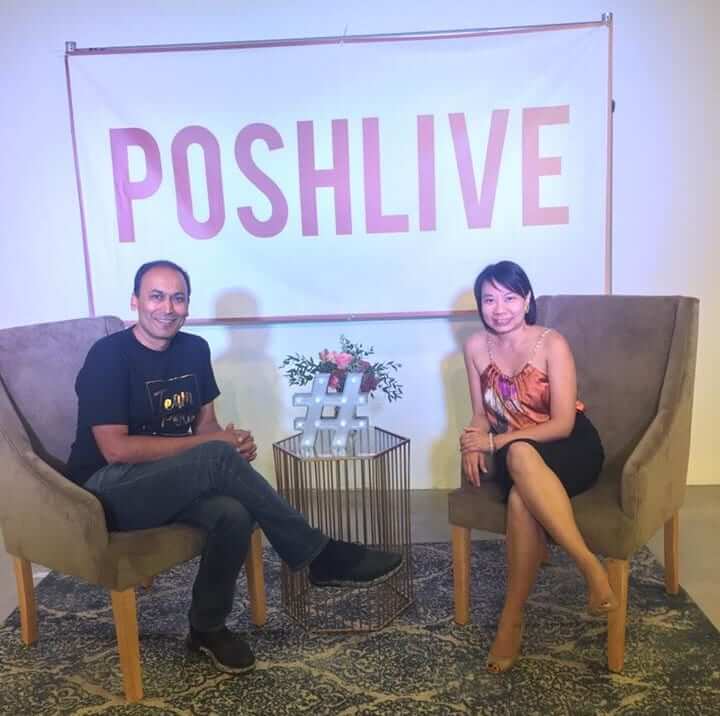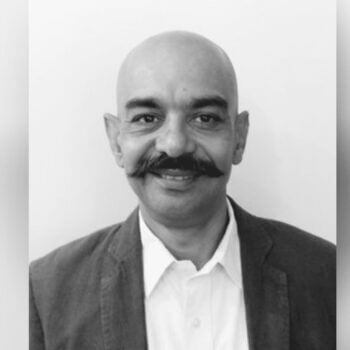(This is one in a series of articles and interviews about conscious business leadership, which is about leaders creating and promoting workplaces of understanding, honesty, and compassion, for the betterment of their employees, their community, their organization and world.)
I recently met Manish Chandra, the founder and CEO of Poshmark, the mobile marketplace for women to buy and sell clothes from each other, whether directly from their closets or by creating their own boutique. We were at PoshFest (1st-2nd October), Poshmark’s annual fashion conference which brings together hundreds of stylish, entrepreneurial women from all across the country for a weekend packed with inspirational speakers, educational panels and workshops, fun parties and networking opportunities. This year they made conscious efforts to bring wholesale brands to the fest to support their Poshers to stock their own boutiques online and not just sell out of their own closets.
Prior to Poshmark, Manish had been the founder and CEO of Kaboodle, Inc. which was sold to Hearst Corporation in 2007.
Manish, how do you keep making these new and successful startups?
I started meditating in 2005, that’s when I started to see things differently. One truth I have found is that when a company helps people to connect and empower one another – magic happens.
I knew I wanted to create a very people-centric business. This means a business where people love coming to work. So it was a conscious decision when I started my first company. I made a lot of mistakes and learned a lot that I am now applying to Poshmark. We are proud of how we built the company and the community. There were principles that were hidden before that are now more obvious to me – I can state them more clearly. For example, one of the core things about Poshmark is the way you merchandise the items is by supporting each other. The whole merchandising system is built so that the only way Poshers can gain more audience is if they share and promote other Poshers. The sharing, unlike other markets, where you pay other people to promote your items, is free. This is based on a thesis that in order to build a scalable marketplace we have to focus on love and sharing love. If you focus on love money comes. But if you focus on money, nothing comes. The reality is if we are just chasing money, then eventually we basically get tired, exhausted. Even if we have enough money we really are not there because every one of us essentially wants to be loved – and that affects the way we think about the business and community.
It was reported that Poshmark has amassed more than 1.5 million sellers, who engage with the app an average of seven times (and 25 minutes) per day. At PoshFest, I can see that you have a whole room of women committed and collaborative.
On the flip side, there are reviews which are very unhappy with you service and customer service. How do you handle these people who may be unhappy with your service?
We have to keep growing at every dimension of the company. I feel that at every stage of growth you have to keep improving the company. But the app reviews are a mixed thing. I take negative reviews with a pinch of salt but then again whatever feedback we get, we have to keep improving. At each stage, there are things we are doing well and there are things we are not doing well. We have to take the things we are doing well and keep expanding the way we look at it is, that for me, one of the principles I learnt. This is the only thing can sustain long term happiness is growth.
If you are not growing as a company; as a human being; as a person; you are not happy. It doesn’t matter how you are growing but you have to keep growing. If you are growing from a business perspective or from a personal perspective; growth is not always easy and simple. Growth has pain involved but we have to keep growing. Growing is what we we have to do as a company. Growing is what we have to do for our sellers. Growing is what we have to do for our employees. I have to do it. I feel when the company is not growing; I am personally not growing. So you have to keep forcing yourself to grow.
That’s interesting, so how do you as a leader keep yourself growing or forcing yourself to grow?
By surrounding yourself with people who are pulling and pushing you in different directions. Challenging you. When I started Poshmark, I had already built a successful company, Kaboodle. One of the things I saw with a lot of entrepreneurs is when they start a successful company; the next company typically fails. So I spent a fair bit of time before I started this company talking to a lot of people about what causes them to fail. I don’t know if you have ever heard the classic story where the emperor is naked and no one tells him. This seems to happen in the second company. Since you’re successful for the first time, nobody wants to give you advice anymore. Everyone thinks that you are always absolutely right. So it very important to have people who can challenge you whether they are your advisors etc. For example recently I joined a group which is focused on CEOs of a certain type of scale and size who are growing. I just attended my first offsite and got really good feedback. This group is called 10X CEO. They have given me feedback about my assumptions that I never challenged and I have been thinking about it. It was a very deep challenge that they give me as a feedback and it came from two to three people.
You did see a link from your mindfulness to your business. How would you suggest that to other leaders who are hesitant or not keen on being so self-reflective.
I feel that for me the spiritual journey that is happening and the physical journey that is happening is very deeply connected. For example, one of my favorite books is The Alchemist by Paulo Coehlo. I refer to it not just in life but also in business. I quote from it most often. For me, there are four books which I call “the paths to happiness”. They are all spiritual books not business books.
Just like how Steve Jobs gave out The Autobiography of a Yogi at his funeral? So what are the four books?
They are The Prophet by Kahlil Gibran; The Alchemist by Paulo Coelho; The Secret by Rhonda Byrne and Jonathan Livingston Seagull by Richard Bach.
Each of them like Jonathan Livingston Seagull is challenging the norm. Each is reminding us about following our own journey. For me, there is a lot of pragmatic advice we get but the real deep advice is spiritual.
I am curious about Poshmark’s expansion plans. As a coach to leaders, and repeatedly, while companies may already have traction and clients but the scaling is the real challenge.
Yes, it is it is the real challenge. You hit the nail on the head. The challenge with scaling is focus. You can be in a business where there are no opportunities. Poshmark is in a business where there are tons of opportunities. A trillion dollar market globally. Examples include China, Europe, and other big markets with temptations; big celebs want to work with us; big fashion brands and indie designers. We just launched kids and men’s too. The key I am working through is as you are scaling how do we maintain focus. Rather than die by a thousand cuts. What makes you successful in the past obviously we have to grow these areas but we have to challenge them too. There are sacred cows in any organization. If you don’t challenge them you don’t grow but if you kill too many of them; you will die as well. It’s this balance. I don’t say I have mastered it but at every point you can figure it out.
Scaling is such a hard problem. Each stage you have to stretch and challenge it. Initially you are so resistant, you say why do I have to it some other way why can’t it stay the same? Then you suffer and the suffering makes you realize that you have to force yourself to keep growing because if you can’t force yourself to do it proactively, you have to do it reactively.
I so agree.
Not that I always remember it. Sometimes you don’t want to change. You’re so happy with the way things are. But like for this event I stepped back and the next generation of leadership in the company – I didn’t even know what was happening. I had the high level thing of what they were doing. And they did such a great job and if I was leaning forward too much they wouldn’t have done such an amazing job. New people were brought in for help with overall event management. Those people have a different freshness.
Bring in great people. Great thought processes stretch and when you bring in good people they also respect where things are coming from but then take you into a new direction. The key is people want to be respected for where they are coming from but they also want to be brought to a new place. Then when they see the new place they don’t want to go back to where they were before because they see all this new things.
I called it aligned. It’s like all the canoes are aligned but they don’t have to look like they are going the same direction. As opposed to before like robots we followed linearly and in one same direction. In the canoes metaphor, some team members may go ahead and they can get to see the new direction and lead the way.
That’s a good metaphor. And in that journey, you find great partners.
How do you choose these people? Great people. Great partners. Do you have a process at Poshmark?
We do have a process. We focus on skill sets and background and a fair bit of time on the culture partnership. It doesn’t have to be exactly the same but we have to fit in a certain way. We work on the Love principle; the Growth principle and the third principle which is very, very, important to us. Every person is unique. If you look at our team and our women at this PoshFest they are all unique and at the same time, all of us feel strange. If we close our eyes we feel something is wrong with us and something is not right. I call that your own unique weirdness. We try to be something otherwise than that weirdness. We try to be the opposite. The only way for us to grow is to embrace our weirdness both as an organization and as a human being.
The principle of Weirdness. That’s a very strong principle. We want to bring people who want to embrace their weirdness. Great organizations die because they want to be someone else. I spend very little time focus on competition and much more time figuring what is our unique weirdness and how can we grow that. Sometimes we have to be determined and focused.
For example, last night we did our own fashion show and we wanted to do it a certain way. We didn’t want a classic fashion show with models. We wanted a fashion show where our community were the models. We partnered with independent brands and our audience was the people who buy the brand to stock in their boutiques on Poshmark. We had women across the country in all shapes and sizes participate and a couple of them walked with their kids. The clothes they were modeling were from our Wholesale Marketplace which sells wholesale and our community sellers were watching it as an audience. We didn’t compromise in any way. We didn’t hire models, we didn’t work with any season.
So looks like Tracy Sun and you started Poshmark and now it is scaling and disrupting the fashion business as usual as you intentionally are not aspiring to be someone else. It’s almost as if you are saying, closets is like each woman’s inner selves and through Poshmark, we are opening up these up. And this is our weirdness and seemingly other people like our weirdness too.
We encourage everyone to embrace their weirdness. We have college dropouts and MBAs from top schools internationally working alongside us at Poshmark. Colleagues from Japan and France – people who are different and bring different points of view. We really appreciate each other.
If a fairy godmother came and granted you a wish. What would be wish for your company as you scale?
We want to be the largest fashion platform in the world
Why you and not someone else?
Because we empower people. We focus on empowerment because every person wants to feel good and beautiful about themselves. Doesn’t matter who you are how you look and how you feel – the empowerment is uniquely being able to take that journey. That journey is not just about selling but feeling who you are. I feel that is just a massive thing that is happening across out the world. Not just in social media. Mobile communications. Globalization. These set a trend that is irreversible. If you go to any part of the world people aspire for similar things – people want and aspire for same thing. So why don’t we do it together?
So I am going to push it a little and say that even if women are not making all their money on Poshmark, it’s already a success. Since what the community and expression is actually the return on investment.
Absolutely. As I said, if I die tomorrow I will be a happy man.
To learn more about Poshmark, please see https://poshmark.com.
Are you a startup looking for investment? Come join me at Expert Dojo’s “Q4 Investor Festival – Where Startups Meet Investors” in Santa Monica, from October 24 to 28. Details at http://expertdojo.com/events/biggest-startup-pitch-event-usa-5-days-focus-get-startup-funded-investor-festival/.
For information about Turning Gen Y On, my recently-published book to help leaders overcome workplace challenges with their Gen Y staff, please see http://tgyo.asia/.






























